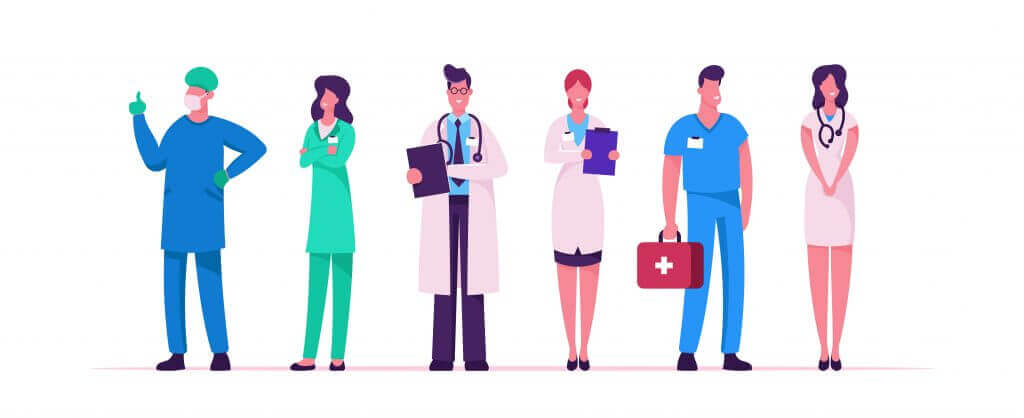Written by Vivaldi Consultant Sumia Hussain Shaikh
You’ll be hard-pressed to find an industry that’s carrying a heavier load during the COVID-19 pandemic than the healthcare industry. Health systems globally are cracking under the pressure of extreme utilization and exhaustion of resources (e.g. healthcare personnel, ICU beds, ventilators, PPE, test kits, etc.) with over 2.4M confirmed cases worldwide and counting.[1] Here in the US, depleted storages, lack of early intervention, and the inefficiencies and inequalities of our health system have already led to tragic health outcomes.

During this difficult time, a notable bright light shines from the number of “unlikely” brands and cross-sector partners that have stepped up in response. These companies are leveraging their massive reach, technology, data, and business assets to join in the fight alongside healthcare systems. Once rivals in business, these brands are coming together when it matters. For example, 15 global pharmaceutical and biotech companies (i.e. Novartis, Sanofi, J&J, Eli Lilly, Merck (MSD), Pfizer, etc.) have committed to sharing proprietary assets and expertise to find a vaccine through the COVID-19 Therapeutics Accelerator led by the Bill and Melinda Gates’ Foundation, the Wellcome Trust, and Mastercard.
Furthermore, we’ve seen a rise in brands outside of “traditional healthcare” pool resources to contribute to fighting the COVID-19 pandemic. For example, a past Vivaldi client, ABinBev is producing and distributing hand sanitizers as well as redirecting $5M in sports and entertainment ad spend to support the American Red Cross in getting more blood donations.
This surge in collaboration across sectors, ecosystems, and organization is not only an inspiring tribute to the ingenuity of humankind and our ability to come together, but also a prime example of why Platform Thinking prevails as the new model of value creation.
Simply stated, Platform Thinking is a fundamental new way of doing business – from when businesses focus exclusively on competition (or disruption) to when businesses center on collaboration and mutual value creation to solve big, complex problems. Problems like a deadly, extremely contagious pandemic.
Platform Thinking companies are focused on leveraging their interactions (engagement, collaboration, data) and not just transactions (which stems from the old industrial era model) at the core of their business – between two or more participants.
Companies that leverage Platform Thinking are the ones that know how to leverage their Interaction Fields – creating, facilitating, and motivating interactions, collaborations and connections and in turn creating value for all those involved.
Here is a short list of notable initiatives or companies that exemplify Platform Thinking:
- Pharmaceutical and biotech companies working together – Pharmaceutical companies are coming together during this global pandemic in several ways. As aforementioned, by aggregating scientific, development and manufacturing resources, pharma and biotech companies are racing together toward therapeutics. Many public-private partnerships are popping up in collaboration with government, public health, digital health, and pharma companies like this partnership set up with the NIH, FDA, Foundation for the National Institutes of Health, and 16 pharma companies. Additionally, pharma companies are freeing medical professionals and employees who are registered healthcare professionals to join the front lines while providing pay and job security for them.
- MIT COVID19: Beat the Pandemic Challenge – MIT affiliates launched a series of Hackathons that bring together global partners, including payers (payers, hospitals, pharmaceutical companies, startups, innovation accelerators, digital health companies, universities, etc.) with the sole purpose of collaborating to solve the world’s most pressing challenges around the COVID19 outbreak. Collaborators included Takeda Pharmaceuticals, Johnson & Johnson Innovation, Amazon Web Services, MIT Hacking Medicine, Merck (MSD), BCG Digital Ventures, and more. During their first weekend virtual hackathon, the initiative had 1,500+ participants, 250+ mentors, and 40+ partners working together from 100 countries to focus on two challenges:
(1) Protecting Vulnerable Populations: How to protect vulnerable populations from the effects of COVID-19?
(2) Helping Health Systems: How to support hospitals with shortage of staff, supplies, and resources?
- Privacy Preserving Contact Tracing: Apple and Google—once staunch adversaries in the Android vs iPhone mobile game—are coming together to bridge the gap and leverage their network of 3.5 billion active phone users to tackle contact-tracing for COVID-19 with collaboration with developers and government / public health organizations. (source)
- Uber’s “Helping Move What Matters” initiative: supporting local restaurants with UberEats, and moving supplies through UberFreight, and working with Uber Health’s efforts to provide 10 Million rides and deliveries to healthcare workers and those in need.
It’s critical to understand that the companies or organizations that are the center of these initiatives – like MIT Hacking Medicine, the Bill and Melinda Gates Foundation, Apple and Google – have been in part successful due to their ability to (1) identify who are the players in their interaction field, and (2) how to best leverage their interaction field.
Brands that are teaming up to aggregate data and technology, or provide ancillary services to pandemic relief efforts demonstrate us how the age of Platform Thinking is not only here, but also that brands that leverage their interaction fields best are the ones that are most impactful in solving big, complex challenges.
If you’re interested in learning more about Platform Thinking, Interaction Fields, and our Platform Thinking Workshop (or how your company can think about best identifying and leveraging your interaction fields for business impact), please email us at hello@vivaldigroup.com.
_
Sumia Shaikh joins Vivaldi after working for years at the intersection of Corporate Innovation and Biotech at Vertex Pharmaceuticals. She also spent several years supporting partnerships and growth for early-stage startups at MassChallenge. Sumia has a Bachelor of Science in Allied Health Sciences with a concentration in Public Health. She’s particularly interested in how digital health and wellness brands leverage new technologies, data, and innovation strategies for impact.
[1] https://www.who.int/emergencies/diseases/novel-coronavirus-2019
